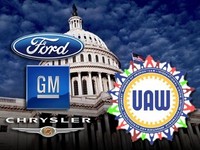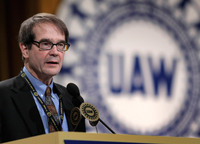UAW Supports Higher Cafe Standards - TACH Hopes They Wake Up To How An E85 Mandate Could Help All Americans and U.S. Auto Makers
Co-publisher's Note: As a grandson of one of the organizers of the LGWU I have always been pro-union and pro doing the right thing. So it’s all well and good the UAW is now supporting the benefits to America from improved MPG, but that is just baby steps compared to what the UAW could support as it pertains to our mobility fuel.
I believe that the UAW has the clout (but apparently not the guts) to step up and use their power to really make the difference that moves our wonderful country onto the right track to exponentially grow our economy, improve the lives of UAW members, help the UAW employers (America’s car makers, boost the income of American farmers and reinvigorate America’s industries while simultaneously eliminating the undue influence of OPECs monopolistic bad guys.
In February 2010 The Auto Channel editorialized that the UAW and its American carmaker employers have the silver bullet that could in a matter of months begin to actually solve the Ills that the past 100 years of the gasoline monopoly have created and sustained, we titled that editorial America’s Problem, American Solution.
America’s car makers have been on the forefront of building Flex-fuel vehicles, more so than any other car makers in the world…so why isn’t the UAW vigorously promoting a mandate for a change over to domestic and sustainable E85 and away from anti-American regular gasoline…it could only benefit all Americans… hmmm even the obstructionists in Washington DC might have to support that.
No we are not naïve, and yes we have heard all of the arguments by Oil bought politicians and know nothing journalists as to why America can’t or won’t leave gasoline, but we think that’s all snake-oil. What do you think? bgordon@theautochannel.com
SEE ALSO: America's Problem - American Solution
SEE ALSO: The Economy Can't Improve Unless There's a Reason to Improve - Tax Cuts or Increases are Irrelevant
Public Hearing for Proposed Greenhouse Gas Emissions Standards and Fuel Economy Standards for Light-Duty Vehicles in Model Years 2017-2025
Detroit, Michigan, January 17, 2012; Testimony of UAW President Bob King
Hello and thank you. My name is Bob King, and I am President of the United Auto Workers International Union. The UAW represents close to 1,000,000 active and retired members across a diverse range of industries and occupations, but we are of course concentrated in the motor vehicle sector. Over 150,000 UAW members work in the light-duty vehicle and parts industry that the proposed rules cover.
It’s an honor to be here this morning, on behalf of our membership, to voice the UAW’s full support for the proposed rules regulating greenhouse-gas emissions and fuel economy. The proposed rules are sensible, achievable, and needed. They are good for the auto industry and its workers, good for the broader economy, good for the environment and good for our national security.
Adopting the proposed rules will give an additional boost to the revitalization of the auto industry that began with President Obama’s courageous action in the depths of the industry’s crisis to save American manufacturing jobs by giving GM and Chrysler the breathing room they needed to restructure. After a painful process in which workers and retirees made significant sacrifices, the industry is coming back strong. Our union’s new collective bargaining agreements with Ford, General Motors and Chrysler include substantial investment commitments by all three companies, in some cases bringing back work from overseas. The 20,000 UAW-represented hourly jobs that will be added over the next four years will have a substantial positive ripple effect throughout the supply chain as well as local communities.
One important reason we are so confident about the industry’s future is that we are excited about the new green technologies that are being developed in the United States and produced in UAW-represented facilities. The drive to bring innovative fuel-saving technologies to market is transforming the auto industry in the United States and creating good jobs from the research lab to the factory floor.
General Motors, Ford and Chrysler have made an unprecedented commitment to invest billions of dollars in their U.S. operations over the next few years, and in every case the investment is supporting new vehicles and powertrains that will be more efficient than the previous generation.
This includes exciting advances such as 8- and 9-speed automatic transmissions, both dual-clutch and conventional; engines that feature advanced valve timing and gasoline direct injection; downsized and turbo-charged engines, and vehicles that are considerably lighter than the previous generations but retain the same size. Technologies such as start-stop systems and electric power steering are also making a contribution to vehicle efficiency.
There is a common element for all these technologies – they are all now or will soon be produced by UAW members in factories located in the United States.
And that’s just the beginning – UAW members are also producing new technologies that may not reach large volumes for many years, but that represent the long-term future of the industry. That includes hybrid transmissions and electric-drive components, lithium-ion battery packs, and plug-in and pure electric vehicles. Although most automakers will continue to meet fuel-efficiency and tailpipe emission targets through improvements to conventional vehicles, we are excited that these new, transformative technologies are being produced by UAW members.
These are the automotive jobs of the future, and we are very pleased that they are starting to ramp up now, here in the United States. Thanks to the fresh start President Obama gave the domestic auto industry, new labor agreements that are the result of an innovative, problem-solving approach to bargaining, and the strong, transparent working relationship we have with UAW employers, the U.S. auto industry is growing and adding employees. These proposed rules are a cornerstone of that growth. They provide certainty as manufacturers map out their product and investment plans.
I want to underscore why we believe the drive to increase fuel-efficiency and reduce tailpipe pollution is creating jobs in the U.S. auto industry. One obvious reason is that consumers are demanding more fuel-efficient vehicles, and meeting that demand is an increasingly important part of this business. In an age of rising and volatile fuel prices, American families want to save money on fuel.
A second, more fundamental reason is because the technology needed to improve efficiency and reduce pollution represents additional content on each vehicle. That additional content must be engineered and produced by additional employees.
Last year the UAW, the Natural Resources Defense Council, and Larry’s organization, the National Wildlife Federation, produced a report called “Supplying Ingenuity.” That report identified more than 500 separate facilities in the United States employing over 150,000 people where some or all of the employees are working to invent, engineer or produce advanced vehicles and fuel-saving components. These are real jobs supporting real American families.
I also want to say that the UAW believes that the auto manufacturers, all the companies that participated in the technical discussions about these proposals and signed a letter of commitment to support its framework, deserve tremendous credit for their commitment to dramatically increase the efficiency and reduce the emissions of the vehicles sold in the United States.
This is a testament to good government. It shows how government can bring disparate stakeholders together to solve problems that are important to the American public. These proposed rules will reduce the pollution that contributes to climate change, significantly reduce America’s dependence on foreign oil, and save American families money at the pump. They will also create jobs in the auto industry and throughout the economy.
That’s an incredible set of positive effects from these proposed rules, and it sums up why the United Auto Workers are in strong support of these proposals. President Obama and his administration, including the two agencies here today, did a great job in developing the proposed rules, and we thank the President for all the great work he has done to strengthen the American automobile industry and automotive communities. Thank you for your time and consideration.
Excerpt from TACH Editorial America's Problem - American Solution Published February 10, 2010
Just imagine the positive effect that production, distribution and use of sustainable, domestic Bio-Ethanol fuels will have on the United States and the world.Farmers will benefit (and why shouldn’t they). Their income will grow by adding additional non-food crops to their harvest, and the remnants from grain used to make ethanol can be used as high grade feed for their own livestock. The remainder can be exported for sale internationally. (It's already happening, last year American farmers exported $1 billion dollars worth even with the tiny number of current ethanol users…just imagine 10 times the volume - wow!)
American Car Makers will benefit immediately because they'll have a competitive advantage over the off-shore car companies in designing, building and selling flex-fuel vehicles. (Almost 10 million flex fuel cars and trucks have already been sold here in the U.S. and more promised - U.S. carmakers are already doing their part – thanks! And as the imported brands see how serious the American drivers are about ethanol, I'll bet that every car maker will finally add flex fuel vehicles to their North American offerings.)
UAW; North American union workers will immediately benefit from the additional demand for more flex fuel vehicles they are already building at GM, Ford and Chrysler. And when the other brands wake up their workers will get busier as well.
North American Car Dealers; at first, the domestic brand car dealers will sell more cars, hire more people and sponsor more local events and organizations, like your kids soccer or little league, your hospital auxiliary, local library and arts…you know, the things they have historically contributed to their local communities. And as soon the foreign Marques see that Americans are serious about getting off of oil, they will also offer flex-fuel models…giving fence sitters another good reason to buy a new car.
Owners of Existing Vehicles will benefit from lower fuel prices and far less harmful emissions. NEARLY ALL EXISTING FUEL-INJECTED VEHICLES CAN ALREADY SAFELY USE UP TO E-20 GASOLINE WITHOUT ANY MODIFICATIONS. Most can use E-85, and they can all be easily and inexpensively converted to use up to E100. And most amazing of all, the cars can still use gasoline so they are never out of range should the driver not be able to find an ethanol fuel station.
American Entrepreneurs and Employees; It is estimated that an ethanol society here in the U.S. will support hundreds of thousands of new small businesses and millions of additional good paying jobs. Who is more creative than American business people… new ways to make and monetize the new manna will explode on the economy giving it a boost never seen before.
U.S. and Canadian Government; Foreign policy can concentrate on the good guys not the bad guys and on what’s right, not just on what’s expedient to keep our stash of oil coming.
U.S. and Canadian Military; no more need to waste another patriot’s life protecting our source of black poison, and we can save tax money too.
North America's Economy; as we get off of expensive petroleum based fuels and replace them with cheaper domestic renewable bio-ethanol, the cost of domestic transportation, farming and manufacturing will go down, making local domestic manufacturing more competitive, and don’t we really need that? Plus the demand for an additional 50 billion gallons of ethanol will generate almost 1 million new jobs here, and the reintroduction of the $365 Billon now going to OPEC for imported oil will boost our whole economy
Our Planet; whether you believe in man-made climate change or not, eliminating tail pipe poison can only help our environment, and because we can reduce our carbon footprint we can take the high road and become the example to other countries.




